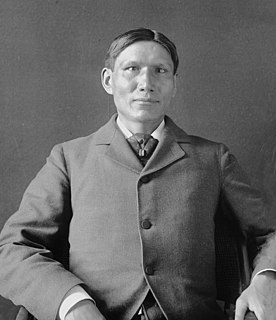A Quote by Charles Eastman
The native American has been generally despised by his white conquerors for his poverty and simplicity.
Quote Topics
Related Quotes
The native American has been generally despised by his white conquerors for his poverty and simplicity. They forget, perhaps, that his religion forbade the accumulation of wealth and the enjoyment of luxury... Furthermore, it was the rule of his life to share the fruits of his skill and success with his less fortunate brothers. Thus he kept his spirit free from the clog of pride, cupidity, or envy, and carried out, as he believed, the divine decree-a matter profoundly important to him.
You see the one thing I've always maintained is that I'm an American Indian. I'm not a Native American. I'm not politically correct. Everyone who's born in the Western Hemisphere is a Native American. We are all Native Americans. And if you notice, I put American before my ethnicity. I'm not a hyphenated African-American or Irish-American or Jewish-American or Mexican-American.
For over a thousand years Roman conquerors returning from the wars enjoyed the honor of triumph, a tumultuous parade. In the procession came trumpeteers, musicians and strange animals from conquered territories, together with carts laden with treasure and captured armaments. The conquerors rode in a triumphal chariot, the dazed prisoners walking in chains before him. Sometimes his children robed in white stood with him in the chariot or rode the trace horses. A slave stood behind the conqueror holding a golden crown and whispering in his ear a warning: that all glory is fleeting.
Malcolm Fraser, in the marrow of his bones, despised racism. He despised people who discriminated against other people because they were different and in particular because of the colour of their skin, and I don't think there has been a time in Australian politics where there has been more attention to the importance of that value.
Carl Jung tells in one of his books of a conversation he had with a Native American chief who pointed out to him that in his perception most white people have tense faces, staring eyes, and a cruel demeanor. He said: “They are always seeking something. What are they seeking? The whites always want something. They are always uneasy and restless. We don't know what they want. We think they are mad.
Perhaps even more than constituted authority, it is social uniformity and sameness that harass the individual most. His very "uniqueness," "separateness" and "differentiation" make him an alien, not only in his native place, but even in his own home. Often more so than the foreign born who generally falls in with the established.

































